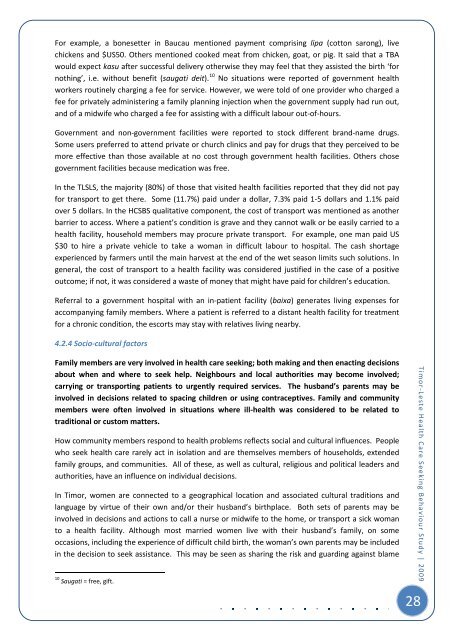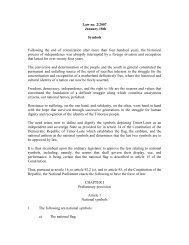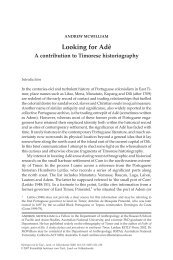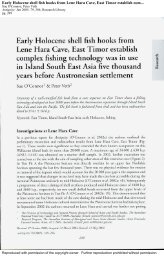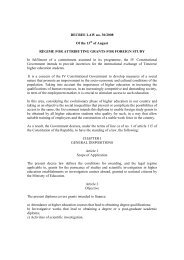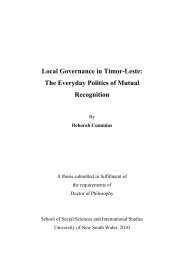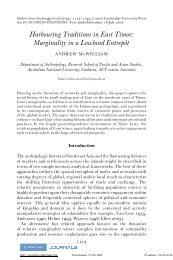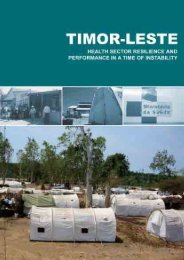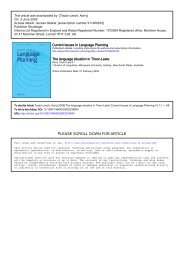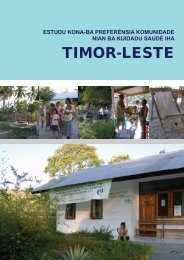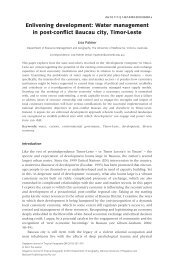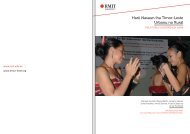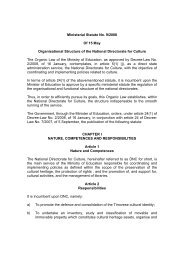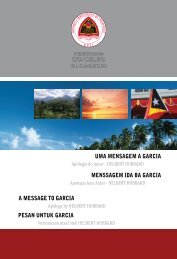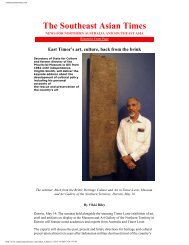Timor-Leste Health Care Seeking Behaviour Study - Secretaria de ...
Timor-Leste Health Care Seeking Behaviour Study - Secretaria de ...
Timor-Leste Health Care Seeking Behaviour Study - Secretaria de ...
- No tags were found...
You also want an ePaper? Increase the reach of your titles
YUMPU automatically turns print PDFs into web optimized ePapers that Google loves.
For example, a bonesetter in Baucau mentioned payment comprising lipa (cotton sarong), livechickens and $US50. Others mentioned cooked meat from chicken, goat, or pig. It said that a TBAwould expect kasu after successful <strong>de</strong>livery otherwise they may feel that they assisted the birth ‘fornothing’, i.e. without benefit (saugati <strong>de</strong>it). 10 No situations were reported of government healthworkers routinely charging a fee for service. However, we were told of one provi<strong>de</strong>r who charged afee for privately administering a family planning injection when the government supply had run out,and of a midwife who charged a fee for assisting with a difficult labour out-of-hours.Government and non-government facilities were reported to stock different brand-name drugs.Some users preferred to attend private or church clinics and pay for drugs that they perceived to bemore effective than those available at no cost through government health facilities. Others chosegovernment facilities because medication was free.In the TLSLS, the majority (80%) of those that visited health facilities reported that they did not payfor transport to get there. Some (11.7%) paid un<strong>de</strong>r a dollar, 7.3% paid 1-5 dollars and 1.1% paidover 5 dollars. In the HCSBS qualitative component, the cost of transport was mentioned as anotherbarrier to access. Where a patient’s condition is grave and they cannot walk or be easily carried to ahealth facility, household members may procure private transport. For example, one man paid US$30 to hire a private vehicle to take a woman in difficult labour to hospital. The cash shortageexperienced by farmers until the main harvest at the end of the wet season limits such solutions. Ingeneral, the cost of transport to a health facility was consi<strong>de</strong>red justified in the case of a positiveoutcome; if not, it was consi<strong>de</strong>red a waste of money that might have paid for children’s education.Referral to a government hospital with an in-patient facility (baixa) generates living expenses foraccompanying family members. Where a patient is referred to a distant health facility for treatmentfor a chronic condition, the escorts may stay with relatives living nearby.4.2.4 Socio-cultural factorsFamily members are very involved in health care seeking; both making and then enacting <strong>de</strong>cisionsabout when and where to seek help. Neighbours and local authorities may become involved;carrying or transporting patients to urgently required services. The husband’s parents may beinvolved in <strong>de</strong>cisions related to spacing children or using contraceptives. Family and communitymembers were often involved in situations where ill-health was consi<strong>de</strong>red to be related totraditional or custom matters.How community members respond to health problems reflects social and cultural influences. Peoplewho seek health care rarely act in isolation and are themselves members of households, exten<strong>de</strong>dfamily groups, and communities. All of these, as well as cultural, religious and political lea<strong>de</strong>rs andauthorities, have an influence on individual <strong>de</strong>cisions.In <strong>Timor</strong>, women are connected to a geographical location and associated cultural traditions andlanguage by virtue of their own and/or their husband’s birthplace. Both sets of parents may beinvolved in <strong>de</strong>cisions and actions to call a nurse or midwife to the home, or transport a sick womanto a health facility. Although most married women live with their husband’s family, on someoccasions, including the experience of difficult child birth, the woman’s own parents may be inclu<strong>de</strong>din the <strong>de</strong>cision to seek assistance. This may be seen as sharing the risk and guarding against blame10 Saugati = free, gift.<strong>Timor</strong>-<strong>Leste</strong> <strong>Health</strong> <strong>Care</strong> <strong>Seeking</strong> <strong>Behaviour</strong> <strong>Study</strong> | 200928


